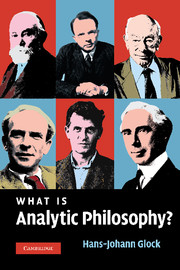2 - Historical survey
Published online by Cambridge University Press: 05 June 2012
Summary
This chapter charts the career of analytic philosophy. After considering the role of analysis in philosophy before the nineteenth century, it looks at the gradual emergence of logical and conceptual analysis in Bolzano, Frege, Moore and Russell. It then considers two subsequent sea-changes. First the linguistic turn of analytic philosophy at the hands of Wittgenstein, logical positivism and conceptual analysis; then the reversal of that turn, notably through the rehabilitation of metaphysics, the rise of naturalism, the triumph of mentalist approaches to mind and language, and the revival of first-order moral and political theory.
PREHISTORY
The word ‘analysis’ stems from the Greek analusis, which means ‘loosening up’ or ‘dissolving’. Two notions of analysis have been central to philosophy almost from its inception (see Beaney 2003). The first derives from Socrates' quest for definitions of terms like ‘virtue’ and ‘knowledge’, and it features in Plato, who speaks of it as ‘division’. Such decompositional or ‘progressive’ analysis applies primarily to what we nowadays call concepts. It is the dissection or resolution of a given concept into component concepts, components that in turn can be used to define the complex concept. Thus the concept of a human being – the analysandum – is analysed into those of an animal and of rationality, thereby delivering the definition of a human being as a rational animal – the analysans.
- Type
- Chapter
- Information
- What is Analytic Philosophy? , pp. 21 - 60Publisher: Cambridge University PressPrint publication year: 2008



